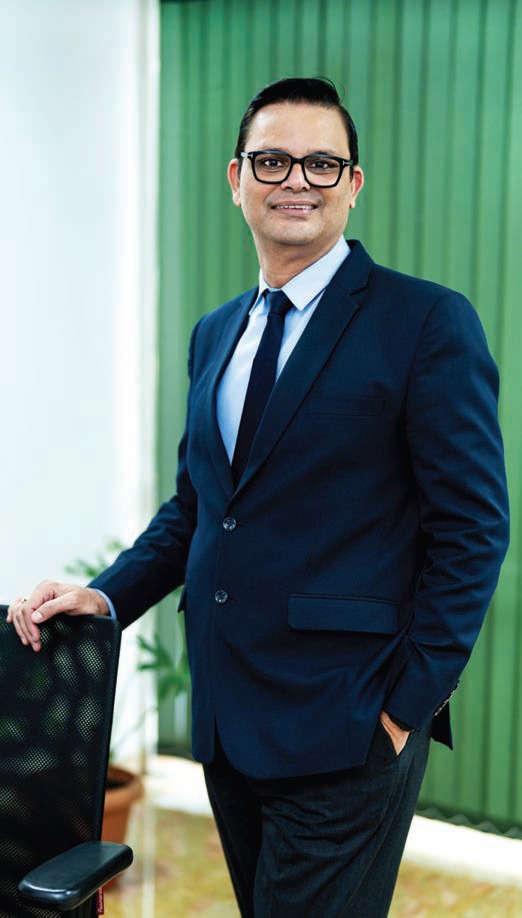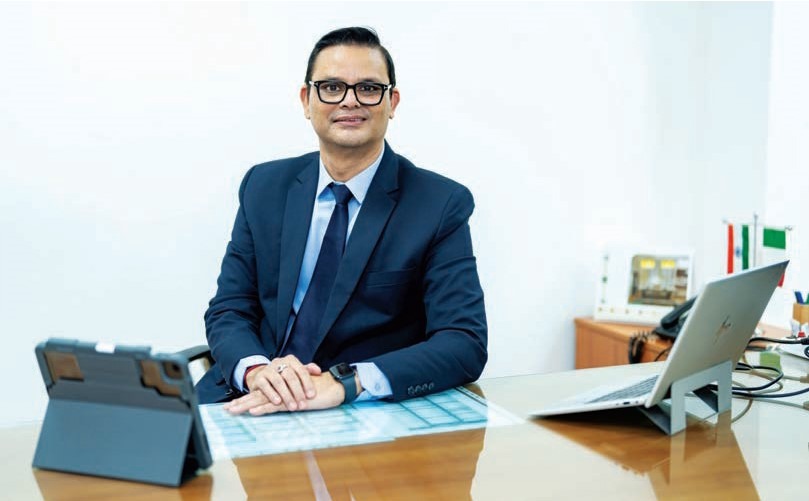Biesse Speaks To GB About The Company’s Glass Processing Innovations, Growth Strategies
In an exclusive interview with Glass Bulletin, Biesse India Director of Sales and Business Development Souma Ray discusses advancements in glass processing technology and the impact of ‘Make in India’ in the company’s global market.
Speaking to Glass Bulletin, Biesse India Director of Sales and Business Development Souma Ray reveals how the invests heavily in R&D, creating cutting- Group, has grown to become the group’s largest manufacturing unit outside Italy. Known for its advancements in glass processing, edge solutions like its Intermac Biesse India offers specialized machinery that meets diverse needs in architectural, automotive, Genius Cutting Tables and Movetro storage systems, which enhance precision and efficiency.

Excerpts:
– Share a brief history of Biesse India and its operations in India, particularly focusing on the glass division?
Founded in 2006 as an extension of the Italian Biesse Group, Biesse India has evolved significantly from a small team of 13 people in a 1,000-squaremeter facility to the Group’s largest manufacturing unit outside Italy.
Now operating from two state-of-the-art facilities in Bengaluru, covering over 35,000 square meters, Biesse India designs, develops, and manufactures a wide range of machinery, demonstrating substantial growth over 18 years.
While primarily known for its woodworking solutions, Biesse India has made notable advancements in glass processing. The company offers specialized machinery for glass fabrication processes, including cutting, edging, drilling, and polishing.
These machines serve various applications, such as architectural, automotive, furniture, and decorative glass, addressing the diverse needs of the glass fabrication and construction industries.
Biesse India emphasizes research and development to remain at the forefront of glass processing technology, featuring robust machine construction with precise CNC control, automated equipment for better glass handling, and specialized software for optimized glass processing. The company provides comprehensive pre-sales advice, installation assistance, and after-sales services, ensuring customers receive full support and maintenance for their equipment. This commitment to innovation and customer service has established Biesse India as a significant player not only in glass processing but also in stone and wood processing.
– Biesse Group is known for cutting edge technology. Can you elaborate on some of the latest technological advancements in the glass division that set Biesse apart from its competitors?
Biesse has made remarkable advancements in its glass division. The machinery is equipped with integrated automation systems that enhance operational efficiency by minimizing manual intervention, reducing errors, and increasing productivity, distinguishing the company within the industry. The Intermac Genius Cutting Table machines incorporate sophisticated software that optimizes cutting paths, resulting in improved precision and efficiency. Additionally, the Movetro storage and handling systems streamline the management and handling of glass sheets. The incorporation of 5-axis CNC machining technology on Biesse Master series machines allows for the creation of intricate glass designs with exceptional accuracy.

– How does Biesse ensure continuous innovation in its glass cutting and processing technologies?
Biesse invests heavily in R&D, with specialized teams focused on developing cutting-edge technologies for glass processing. The machines are designed to adapt to the evolving needs of customers across industries, enabling rapid innovation and tailored solutions. Biesse India manufactures high-tech components in-house, ensuring tight control over innovation and performance.
Additionally, with a global distribution network of 30 direct subsidiary offices, Biesse monitors local market demands and trends, using this information for new product development and continuous improvement. The company also invests heavily in training its global service team, promoting knowledge sharing to support the latest technologies and drive ongoing innovation. In summary, Biesse’s dedication to R&D, modular design, vertical integration, global reach, and employee training drives continuous innovation in glass cutting and processing solutions.
– Biesse has acquired several international glass companies. Tell us about some of these acquisitions
Biesse has strategically strengthened its glass division through several key acquisitions. In 2022, the company acquired Forvet, a manufacturer of specialty equipment for glass machining, for approximately €41 million, enhancing the product range with complementary technologies that support high productivity and flexibility for customers. The acquisition of GMM Finance S.R.L., the holding company of GMM Group, included Bavelloni S.P.A. and its associated companies, known for innovative machinery and tools in the glass processing industry. Biesse aims to enhance its product portfolio by providing competitive solutions tailored to the needs of glass processing customers.
– How have these acquisitions impacted Biesse’s operations in India, particularly in terms of technology transfer and expertise?
These acquisitions have strengthened the Biesse product portfolio, enhancing offerings to the Indian market. The company now has machines to meet any type of glass processing need for customers, showcasing cutting-edge technology and offering competitive, industry leading solutions across the glass processing industry.
– What advantages does the Make in India initiative offer to Biesse’s glass division?
The Make in India initiative offers significant advantages to Biesse’s glass division by attracting foreign direct investment (FDI), which enhances access to advanced technologies and innovative practices in glass manufacturing. It promotes job creation and skill development, aligning with the company’s commitment to cultivating a skilled workforce. Additionally, the initiative helps reduce reliance on imported materials, fostering a more self-sufficient supply chain. Improved infrastructure from government efforts facilitates smoother operations, while the focus on innovation encourages further investment in R&D, strengthening Biesse’s capabilities in both domestic and international markets.
This initiative has encouraged substantial investments in expanding manufacturing capabilities, allowing Biesse to understand market needs and develop solutions for the wood, glass, and composite materials industries at its state-of-the- art facility in Bengaluru. Biesse has been able to diversify product offerings, enabling the production of advanced glass processing machinery tailored to local and global markets.
Additionally, a commitment to innovation and R&D has facilitated job creation, skill development, and exports, with nearly 85% of machines produced in India now reaching over 75 countries.
– Can you provide examples of how ‘Make in India’ has influenced your manufacturing processes and product offerings in the glass division ?
Biesse selected India as the location for its sole manufacturing operations outside Italy, establishing a plant in Bengaluru in 2008. Long before the ‘Make in India’ initiative gained momentum, Biesse positioned itself as a leader in export-oriented production while also addressing domestic market needs. Currently, Biesse manufactures glass cutting tables in India and plans to expand local production to include additional models and technologies in the coming years.
– What is the current presence of Biesse’s glass division in India in terms of facilities, workforce, and market reach?
Biesse operates a state-of-the-art manufacturing facility in Bengaluru, India, where both woodworking and glass processing machines are produced. To effectively serve the market, Biesse has assembled a skilled sales and service team that caters to customers not only in India but also in neighboring SAARC nations, including Bangladesh, Nepal, Bhutan, and Sri Lanka.
– How do you plan to expand Biesse’s footprint in the Indian glass market in the coming years?
With an enhanced product portfolio, Biesse is poised to implement clear year-by-year strategic growth plans in India. The glass industry is rapidly expanding, and Biesse India is eager to reach new heights and increase its market share.
– What are the key trends and challenges you see in the Indian glass industry, and how is Biesse positioning itself to address them and stay ahead of the competition?
India is known for being a price-sensitive market, which enables Chinese manufacturers to sell products even if they do not meet international quality standards. Biesse prioritizes value-based product positioning over price-based
strategies, and its dedicated after-sales and spare parts supply teams based out of Bengaluru ensure machines remain operational without breakdowns, helping customers meet production and delivery commitments. Biesse stands as the only reputable local manufacturer of glass processing machines in India, representing a European brand with a robust manufacturing presence in the country.
– How does Biesse ensure the sustainability and quality of its products in the glass division?
Biesse ensures sustainability and quality in its glass division through renewable energy use, sustainable product development, and circular economy practices, as detailed in its Sustainability Report. The company employs a comprehensive Quality Management System (QMS), certified since 1996, which emphasizes continuous improvement, employee training, and customer feedback integration. This focus on minimizing waste and energy consumption during manufacturing and creating durable, recyclable products enhances both quality and environmental responsibility.
– What are your goals for Biesse’s glass division in India?
Biesse is optimistic about the growth of the glass industry in the coming years, with rapid urbanization and real estate expansion driving demand for high-quality glass. The company is committed to offering multi-material solutions across wood, glass, stone, and composites, which find extensive applications across sectors such as furniture, interiors, construction, automotive, and aerospace.

